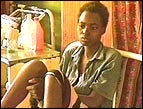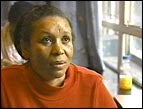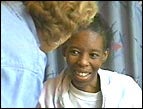
Become a CBN partner and receive The Transforming Word: Verses to Overcome Fear and Experience Peace, our special DVD/CD gift to you.
CBN Partners are making a difference sharing the Gospel of Jesus Christ. Find out how.
CBN.com – "We have pastors who are telling us that they have a minimum of 10 funerals a week, and they can’t keep up with it," states AIDS/HIV educator Vern Tisdalle.
"We found until the last two years, when we would go home to the churches, to be honest, people would sit back and say, 'Ah, this is a homosexual disease. I guess they’re getting what they deserve,'" adds Vern's wife, Belva Tisdalle, also an AIDS/HIV educator.
"Most people are in denial," says Vern. "If it has nothing to do with them, then they feel, well, it’s somebody else’s problem."
 While
South Africa was once well known for apartheid and Nelson Mandela, the issue
facing this nation today is AIDS. There are 40 million people living in South
Africa, and 10 million of them are HIV-positive. With statistics like this,
AIDS isn’t just a problem… it’s an epidemic.
While
South Africa was once well known for apartheid and Nelson Mandela, the issue
facing this nation today is AIDS. There are 40 million people living in South
Africa, and 10 million of them are HIV-positive. With statistics like this,
AIDS isn’t just a problem… it’s an epidemic.
In a report by a leading South African labor relations consultant, it’s predicted that by 2005, almost 30 percent of South Africa’s work force will be HIV-positive. By 2010, the average life expectancy for women will be 37 years; for men, it won’t be much better—38 years.
Sometimes for us in America, statistics like these are just "numbers." But in reality, each number represents a life.
Meet Victor, a 34-year-old man at Rhema Hospital in Johannesburg. He’ll never forget the day he was diagnosed with AIDS.
"I told myself it was the end of the world for me, the end of the road. You can see that I am useless. I cannot go on like this. I couldn’t walk," says Victor. "Somebody had to lift me to take me to the hospital, try to organize maybe taxis. There was no money for that."
Forty-one-year-old Dolores is the mother of four. She, too, has AIDS.
"When I came here," says Dolores, "I was very ill."
And she was afraid.
"The fear gets you because you are going to die," she says. "You’re only thinking of death now."
 Delores
was the victim of a jealous boyfriend. He knew he had AIDS and just wanted
to see his girlfriend die along with him. When Delores first heard she had
AIDS, she wanted to kill herself. Dolores was concerned with being rejected
by her community.
Delores
was the victim of a jealous boyfriend. He knew he had AIDS and just wanted
to see his girlfriend die along with him. When Delores first heard she had
AIDS, she wanted to kill herself. Dolores was concerned with being rejected
by her community.
Says Dolores, "The children, they speak and say, 'Oh, you can get diseases from this one.'"
How are so many people getting AIDS in South Africa? Why is the epidemic spreading so quickly in this particular country?
"If you look at the socioeconomic conditions of the country—you look at unemployment, you look at the cultural issues, you look at poverty, you look at the migratory people, the people that have to go into prostitution to sustain themselves—if you look at the immediate causes, it’s a behavioral issue and it’s a moral issue," explains Dr. Darleen Edwards-Neyer, educational consultant for Africa Wellness Ministries. "There are extra-marital affairs, multiple sexual partners. If you want to get to the root problem, there’s a big relationship problem. People don’t understand why God actually created the marriage, why He wanted us only to have one partner, so HIV is probably a consequence of a very deep lying problem in our country. That is very complex. It is not easy to address the issue."
The issue gets even more complex when you consider the tribal rituals and misconceptions about the cure for AIDS.
"There’s a very widespread myth that says if you think you might be HIV-positive, then find a virgin baby, the younger, maybe a few months old, and have sex with it and that will cure you of AIDS," says Belva Tisdalle. "Then there’s also some practices, for example, if a woman’s husband dies, in order to cleanse her of the spirit of her dead husband, some of the family members, an uncle or brother, must have sex with her to cleanse her. It is called female cleansing."
Add a high occurrence of rape and it is no wonder there is a fatalistic view on life in South Africa, even among the elite.
Continues Tisdalle, "We go into the universities, and, literally, the young people in the universities who are the cream of the crop, they have such a fatalistic attitude: There’s no hospital care, so what are we going to do? It is just a matter of time that I’m going to be infected, so I might as well have fun while I’m doing it, so I’m going to have sex when I can, how I can, because I know I’m going to die early anyhow."
After some adults contract AIDS, it is often passed on to newborn babies. Some are never given a chance at life.
"The sad cases are the babies that are abandoned in the field or in a plastic bag or in dustbins," says Riekie Van der Berg, director of South Africa Cares for Life. "We get several babies from the police. They will phone us and bring a baby any time of the day or night, saying they rescued this baby, the baby’s still alive, can we please help them with that baby."
The statistics on AIDS can seem overwhelming, and when you hear some of the personal stories, there can be a real sense of hopelessness about it. But what we see is that in the midst of this, the one real hope that makes the changed life is Jesus Christ.
"You cannot give somebody Christ without making them feel special, without making them feel that they belong," says Dr. William Mmbara, an AIDS specialist at Rhema Hospital. "Without even a medical intervention, they already have a sense of belonging. Most of the people who die, die not necessarily because of their physical condition, but they die because they lose hope."
No matter what discouragement someone is facing, lives are turned around when people are offered hope and life. But whose responsibility is it to lend this sort of support?
"It is the Church's responsibility to be the moral voice and the conscience for the nations," says Belva Tisdalle. "I throw the thing around and say, What is the church doing? We’ve got to do something. We’ve got to rise up. We’ve got to set the standard and the example."
You may be asking, Why should I be bothered by an epidemic half way across the world? The answer is quite simple.
"Jesus cared, and because He cared, if we are like Jesus at all, then we have to care beyond our own doorstep," Belva Tisdalle notes. "That’s the heart of Jesus."
 CBN
cares beyond its doorsteps through partnerships with Christian services like
Rhema Hospital and Abba House for babies, through Breaking the Silence,
a CBN video about AIDS, and through an AIDS awareness program. We’re
making a difference in South Africa.
CBN
cares beyond its doorsteps through partnerships with Christian services like
Rhema Hospital and Abba House for babies, through Breaking the Silence,
a CBN video about AIDS, and through an AIDS awareness program. We’re
making a difference in South Africa.
Says Belva Tisdalle, "When they see how God’s prescription for sex adapts to their lifestyle, where they live, they’re amazed and say, 'We’ve never heard this before.' It’s been there all the time, but as God changes them, I can give you thousands and thousands of testimonials of young people and couples who say, 'My life has never been the same since I’ve accepted Jesus, and now I apply His Word to my lifestyle. I’ve never transgressed in my sexual behavior since, and now I’m not afraid of AIDS.'"
"We in South Africa have a World Trade Center disaster every day of the year," states Keith Strugnell, Director for CBN Africa. "That’s tragic, but with every tragedy comes opportunity, and God has given us a great opportunity, that through the AIDS ministry, through the education of people, many people are coming to Christ. We’re just thankful to God for another window of opportunity to bring people to Him."
Remember Victor at Rhema Hospital? It was his bout with AIDS that brought him back into the arms of God.
"I started reading the Word of God, reading the Bible, and understanding that it said 'I will never leave thee nor forsake thee,'" says Victor. "I’ve seen the greatness of God, how wonderful He is. There is no friend like Jesus."
A caring friend will be there to pray with you in your time of need.